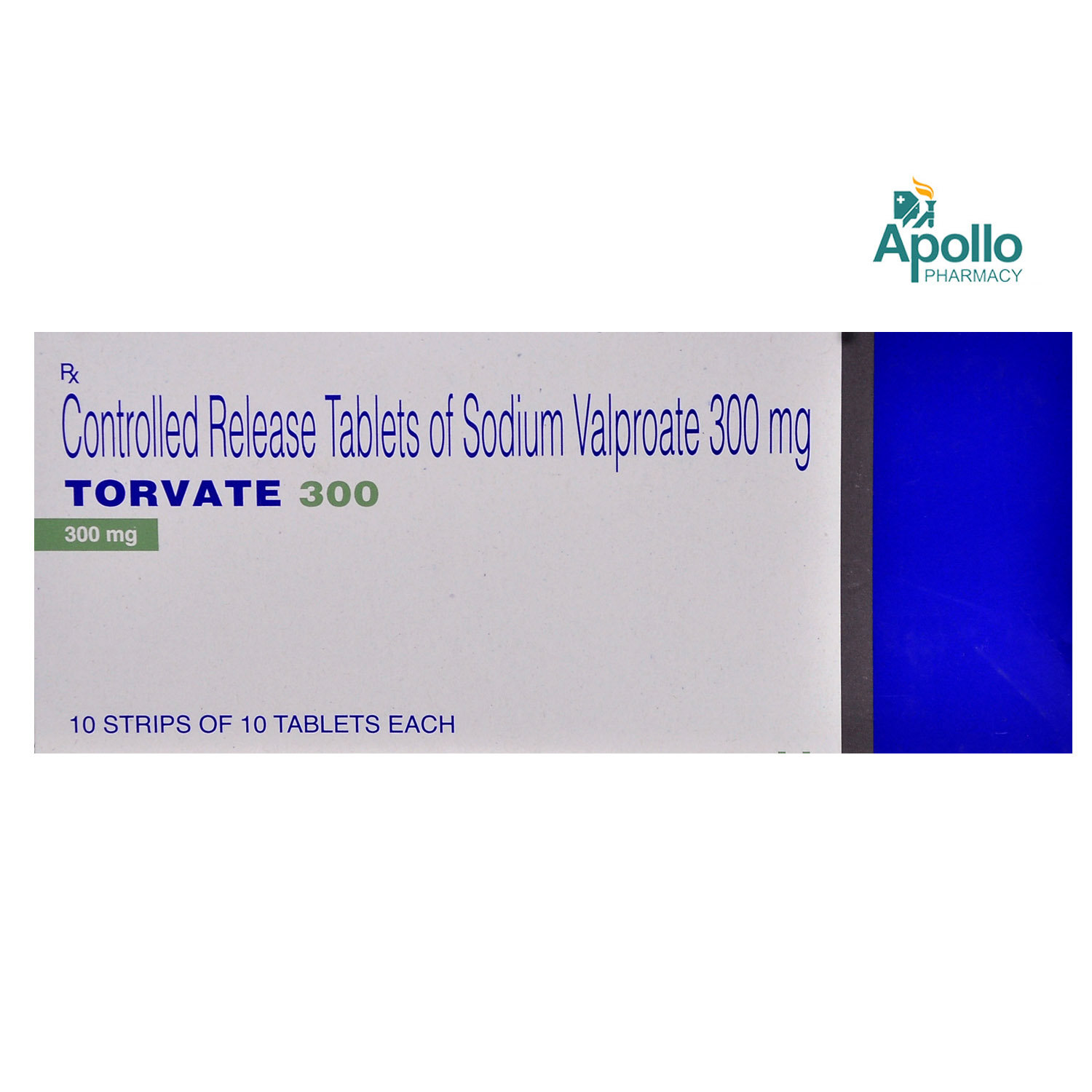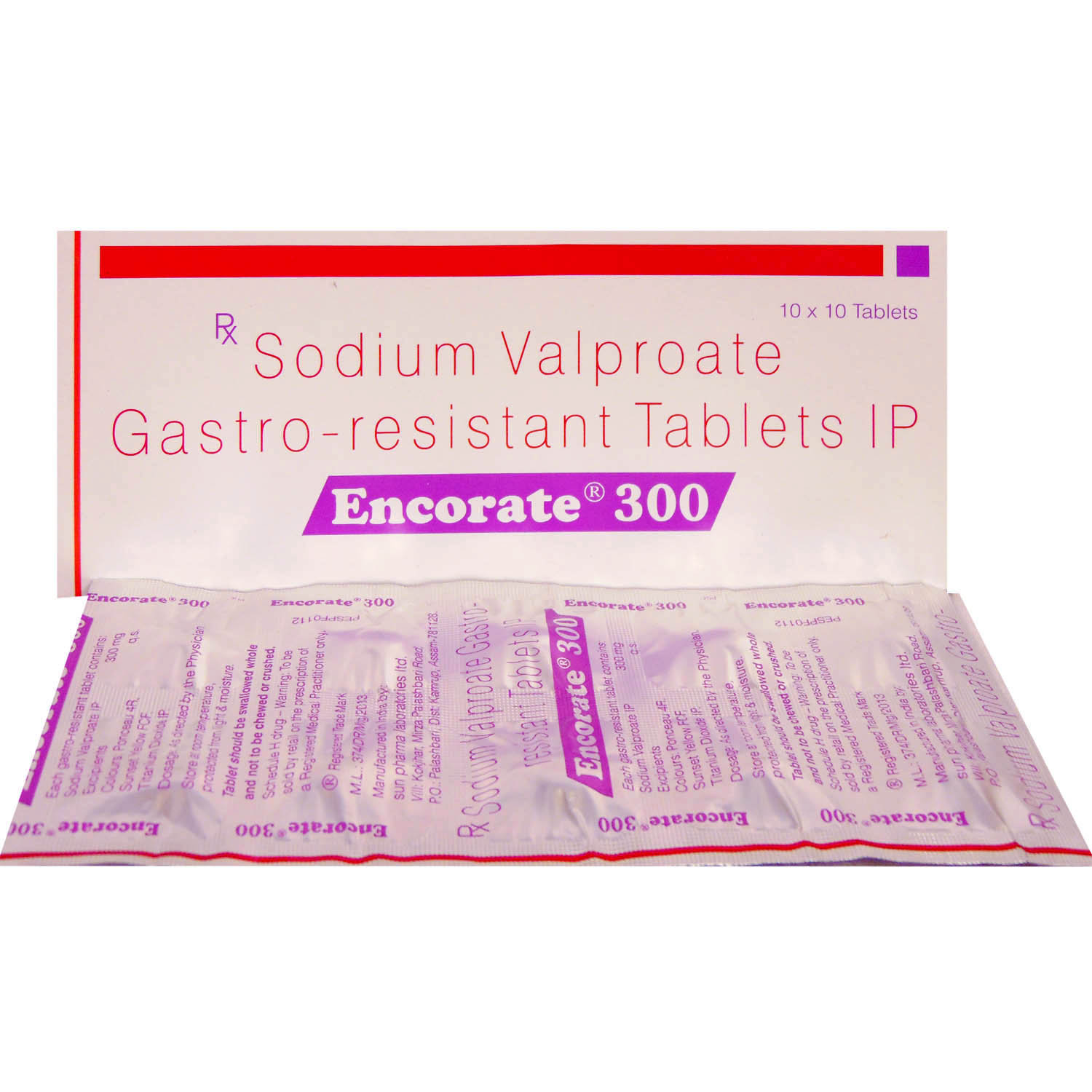Valprid-CR 300 mg Tablet 15's
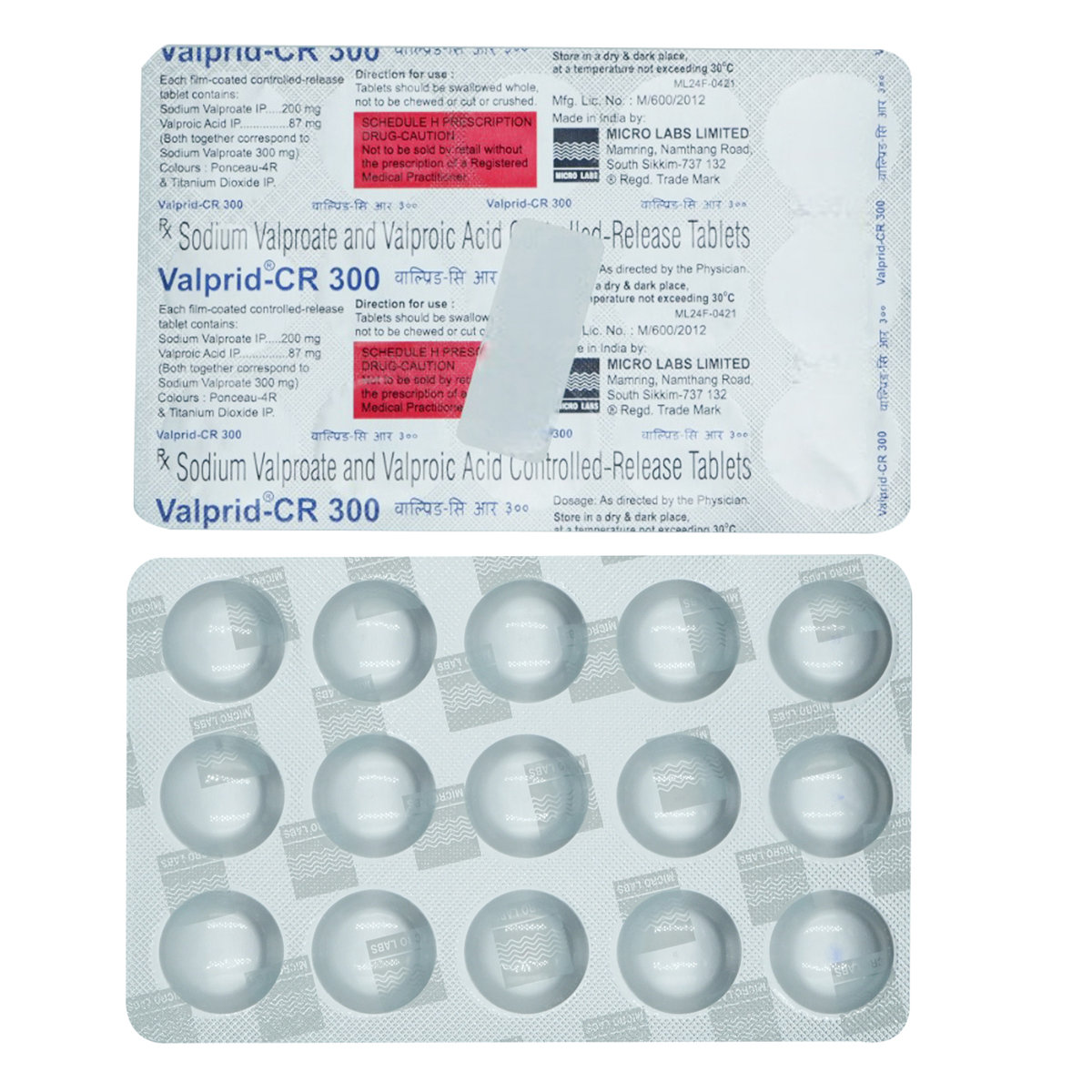
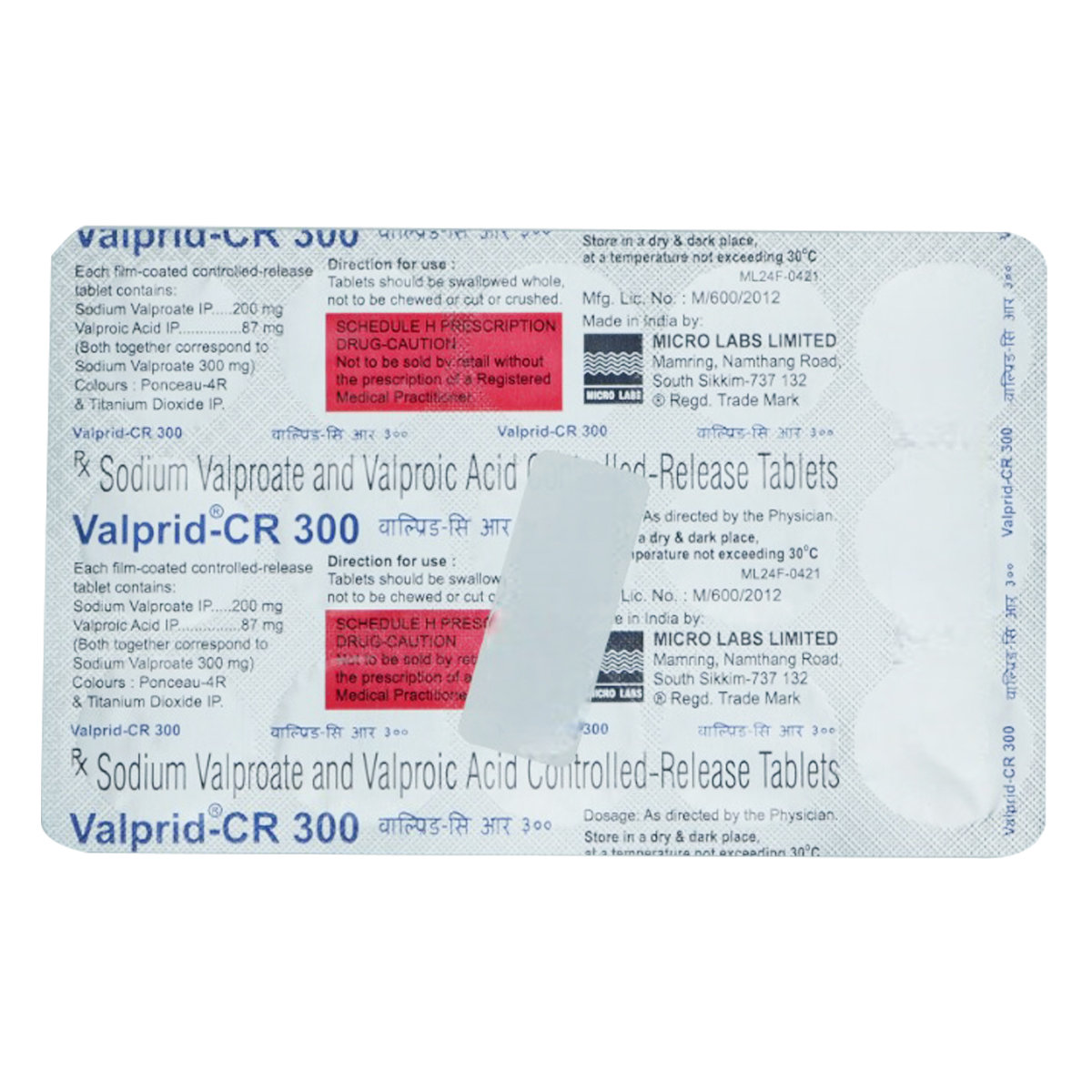
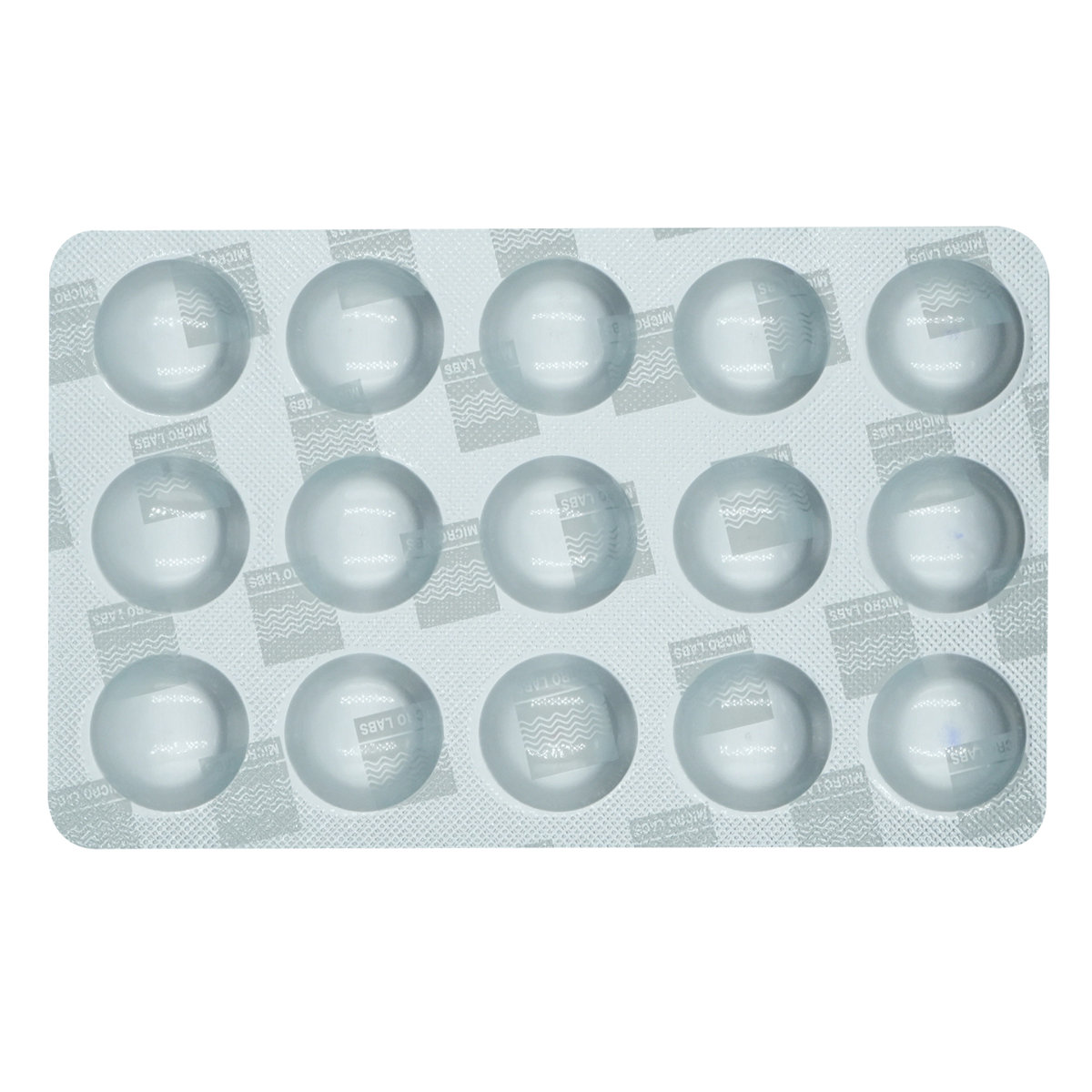
Selected Pack Size:15
15 ₹86.4
(₹5.76 per unit)
In Stock
10 ₹59.5
(₹5.95 per unit)
In Stock
MRP ₹96
(Inclusive of all Taxes)
₹14.4 Cashback (15%)
Valprid-Cr 300 mg Tablet is used to treat epilepsy/seizures/fits. Additionally, it is also used to treat bipolar disorder and prevent symptoms of migraine (like a headache). It contains Sodium valproate, which decreases the excessive and abnormal nerve activity in the brain. Thereby, helps in controlling seizures. It helps block the nerve transmission across the brain and provides a calming effect. In some cases, you may experience certain common side effects, such as stomach pain, nausea, vomiting, dry mouth, tremors, tiredness, sleepiness, headache, weight gain, and hair loss. Before taking this medicine, you should tell your doctor if you are allergic to any of its components or if you are pregnant/breastfeeding, and about all the medications you are taking and pre-existing medical conditions.
Know Your Delivery Time
Provide Delivery Location

Secure Payment

India's Most Trusted Pharmacy

Genuine Products
Composition :
Manufacturer/Marketer :
Consume Type :
Return Policy :
Expires on or after :
About Valprid-Cr 300 mg Tablet
Valprid-Cr 300 mg Tablet is used to treat epilepsy/seizures/fits. Additionally, Valprid-Cr 300 mg Tablet is also used to treat bipolar disorder and prevent symptoms of migraine (like a headache). Epilepsy is a sudden rush of electricity in the brain. In epilepsy, the brain's electrical rhythms become imbalanced, resulting in recurrent seizures, sometimes leading to an unconscious state.
Valprid-Cr 300 mg Tablet contains 'Sodium valproate', which decreases the excessive and abnormal nerve activity in the brain. Thereby helps in controlling seizures. Valprid-Cr 300 mg Tablet increases the amount of a chemical substance called GABA; this helps block the nerve transmission across the brain and provides a calming effect. Thereby helps treat bipolar disorder.
You can take Valprid-Cr 300 mg Tablet with or without food. You are advised to take Valprid-Cr 300 mg Tablet as long as your doctor has prescribed it for you, depending on your medical condition. In some cases, you may experience certain common side effects, such as stomach pain, nausea, vomiting, dry mouth, tremors, tiredness, sleepiness, headache, weight gain, and hair loss. Most of these side effects do not require medical attention and will resolve gradually over time. However, you are advised to talk to your doctor if you experience these side effects persistently.
Please do not stop taking Valprid-Cr 300 mg Tablet without consulting your doctor to avoid worsening of seizures. Contact your doctor if your child gets her first period whilst on treatment with Valprid-Cr 300 mg Tablet . Do not take Valprid-Cr 300 mg Tablet if you are pregnant, as it could cause serious congenital disabilities. If you are of childbearing age, use effective contraception while taking Valprid-Cr 300 mg Tablet . Consult your doctor before taking Valprid-Cr 300 mg Tablet if you are breastfeeding. Do not drive or operate machinery as Valprid-Cr 300 mg Tablet may cause drowsiness and dizziness. Avoid consuming alcohol along with Valprid-Cr 300 mg Tablet as it could lead to increased dizziness and sleepiness.
Uses of Valprid-Cr 300 mg Tablet
Valprid-Cr 300 mg Tablet is used in the treatment of epilepsy, bipolar disorder, and migraine. The detailed uses of Valprid-Cr 300 mg Tablet are as follows:
- Seizure Management: Valprid-Cr 300 mg Tablet is primarily used to manage various types of seizures in individuals with epilepsy, helping to stabilise electrical activity in the brain.
- Bipolar Disorder Treatment: Valprid-Cr 300 mg Tablet can be utilized in the treatment of bipolar disorder, aiding in mood stabilization and reducing the frequency of mood swings.
- Migraine Prevention: Valprid-Cr 300 mg Tablet may also be prescribed to prevent migraines, providing relief from recurrent headaches.

Have a query?
Directions for Use
- Valprid-Cr 300 mg Tablet can be taken with or without food.
- Follow your doctor's instructions on the dosage and timing of this medication.
- Swallow Valprid-Cr 300 mg Tablet as a whole with a glass of water.
- Do not crush, break, or chew it.
Medicinal Benefits
Valprid-Cr 300 mg Tablet belongs to a group of anticonvulsants or anti-epileptics used to treat epilepsy (fits). Additionally, Valprid-Cr 300 mg Tablet is also used to treat bipolar disorder and prevent migraine headaches. Valprid-Cr 300 mg Tablet decreases the excessive and abnormal nerve activity in the brain, thereby controlling seizures. Valprid-Cr 300 mg Tablet is used to treat both localized (seizures which affect only a part of the brain) and generalized seizures (seizures which affect the entire brain).
How Valprid-Cr 300 mg Tablet Works
Storage
- Take medications with food (if recommended): It can help prevent stomach distress and indigestion.
- Eat smaller, more frequent meals: Divide daily food intake into smaller, more frequent meals to ease digestion.
- Avoid trigger foods: Identify and avoid foods that trigger indigestion, such as spicy, fatty, or acidic foods.
- Stay upright after eating: Sit or stand upright for at least 1-2 hours after eating to prevent stomach acid from flowing into the oesophagus.
- Avoid carbonated drinks: Avoid drinking carbonated beverages, such as soda or beer, which can worsen indigestion.
- Manage stress: To alleviate indigestion, engage in stress-reducing activities like deep breathing exercises or meditation.
- Consult a doctor if needed: If indigestion worsens or persists, consult a healthcare professional to adjust the medication regimen or explore alternative treatments.
- Inform your doctor about the nausea and discuss possible alternatives to the medication or adjustments to the dosage.
- Divide your daily food intake into smaller, more frequent meals to reduce nausea.
- Opt for bland, easily digestible foods like crackers, toast, plain rice, bananas, and applesauce.
- Avoid certain foods that can trigger nausea, such as fatty, greasy, spicy, and smelly foods.
- Drink plenty of fluids, such as water, clear broth, or electrolyte-rich beverages like coconut water or sports drinks.
- Use ginger (tea, ale, or candies) to help relieve nausea.
- Get adequate rest and also avoid strenuous activities that can worsen nausea.
- Talk to your doctor about taking anti-nausea medication if your nausea is severe.
- Record when your nausea occurs, what triggers it, and what provides relief to help you identify patterns and manage your symptoms more effectively.
- Preventing Vomiting (Before it Happens)
- Take medication exactly as prescribed by your doctor. This can help minimize side effects, including vomiting.
- Having a small meal before taking your medication can help reduce nausea and vomiting.
- Talk to your doctor about taking anti-nausea medication along with your prescribed medication.
- Managing Vomiting (If it Happens)
- Try taking ginger in the form of tea, ale, or candy to help alleviate nausea and vomiting.
- What to Do if Vomiting Persists
- Consult your doctor if vomiting continues or worsens, consult the doctor for guidance on adjusting your medication or additional treatment.
- Inform Your Doctor: Notify your doctor immediately about your diarrhoea symptoms. This allows them to adjust your medication or provide guidance on managing side effects.
- Stay Hydrated: Drink plenty of fluids to replace lost water and electrolytes. Choose water, clear broth, and electrolyte-rich drinks. Avoid carbonated or caffeinated beverages to effectively rehydrate your body.
- Follow a Bland Diet: Eat easy-to-digest foods to help firm up your stool and settle your stomach. Try incorporating bananas, rice, applesauce, toast, plain crackers, and boiled vegetables into your diet.
- Avoid Trigger Foods: Steer clear of foods that can worsen diarrhoea, such as spicy, fatty, or greasy foods, high-fibre foods, and dairy products (especially if you're lactose intolerant).
- Practice Good Hygiene: Maintain good hygiene to prevent the spread of infection. To stay healthy, wash your hands frequently, clean and disinfect surfaces regularly, and avoid exchanging personal belongings with others.
- Take Anti-Diarrheal Medications: If your doctor advises, anti-diarrheal medications such as loperamide might help manage diarrhoea symptoms. Always follow your doctor's directions.
- Keep track of your diarrhoea symptoms. If they don't get better or worse or are accompanied by severe stomach pain, blood, or dehydration signs (like extreme thirst or dark urine), seek medical help.
- Inform your doctor about dizziness symptoms. They may adjust your medication regimen or prescribe additional medications to manage symptoms.
- Follow your doctor's instructions for taking medication, and take it at the same time every day to minimize dizziness.
- When standing up, do so slowly and carefully to avoid sudden dizziness.
- Avoid making sudden movements, such as turning or bending quickly, which can exacerbate dizziness.
- Drink plenty of water throughout the day to stay hydrated and help alleviate dizziness symptoms.
- If you're feeling dizzy, sit or lie down and rest until the dizziness passes.
- Track when dizziness occurs and any factors that may trigger it, and share this information with your doctor to help manage symptoms.
- Apply a hot/cold pack to the affected area.
- Doing gentle exercises can help cope with pain by stretching muscles.
- Get enough sleep. It helps enhance mood and lower pain sensitivity.
- Avoid alcohol, smoking and tobacco as they can increase pain.
- Follow a well-balanced meal.
- Meditation and massages may also help with pain.
What if I have taken an overdose of Valprid-Cr 300 mg Tablet
Drug Warnings
Do not take Valprid-Cr 300 mg Tablet if you are allergic to any of its contents; if you have liver problems, porphyria, urine-related problems (like urea cycle disorder), diabetes, an immune system disorder or kidney problems. Consult your doctor immediately if you experience suicidal tendencies while taking Valprid-Cr 300 mg Tablet . Contact your doctor if your child gets her first period during the treatment with Valprid-Cr 300 mg Tablet . Do not take Valprid-Cr 300 mg Tablet if you are pregnant unless prescribed by the doctor, as it is a pregnancy category C medicine and can cause serious congenital disabilities. Consult your doctor before taking Valprid-Cr 300 mg Tablet if you are breastfeeding. Valprid-Cr 300 mg Tablet may cause drowsiness and dizziness, so drive only if you are alert. Avoid consuming alcohol along with Valprid-Cr 300 mg Tablet as it could lead to increased dizziness and sleepiness.
Drug-Drug Interactions
Drug-Drug Interactions
Login/Sign Up
Combining Sodium phenylbutyrate and Valprid-CR 300 mg Tablet can increase ammonia levels in the blood.
How to manage the interaction:
Taking Sodium phenylbutyrate with Valprid-CR 300 mg Tablet is not recommended, but it can be taken if prescribed by a doctor. If you experience any symptoms like sudden dizziness, lightheadedness, fainting, headache, shortness of breath, nausea, vomiting, chest pain or tightness, rapid heartbeat, or memory loss, contact your doctor immediately. Do not discontinue any medications without consulting a doctor.
Co-administration of Valprid-CR 300 mg Tablet with doripenem can reduce the blood levels of valproic acid.
How to manage the interaction:
Co-administration of Doripenam and Valprid-CR 300 mg Tablet can lead to an interaction, it can be taken if advised by your doctor. However, if you experience sudden dizziness, lightheadedness, fainting, shortness of breath, chest pain or tightness, rapid heartbeat, involuntary muscle movements, or memory loss, contact your doctor immediately. Do not discontinue any medications without consulting a doctor.
Co-administration of Meropenam and Valprid-CR 300 mg Tablet together can reduce the effect of Valprid-CR 300 mg Tablet.
How to manage the interaction:
Co-administration of Meropenam and Valprid-CR 300 mg Tablet can lead to an interaction, but it can be taken if your doctor advises. However, if you experience any unusual symptoms, consult a doctor immediately. Do not discontinue any medications without consulting a doctor.
Co-administration of Vorinostat with Valprid-CR 300 mg Tablet can increase the risk of unusual bleeding.
How to manage the interaction:
Co-administration of Vorinostat and Valprid-CR 300 mg Tablet can lead to an interaction, it can be taken if advised by your doctor. However, if you experience any symptoms like unusual bleeding or bruising, vomiting, blood in your urine or stools, headache, dizziness, or weakness, consult your doctor immediately. Do not discontinue any medications without consulting your doctor.
The combined use of Ertapenem and Valprid-CR 300 mg Tablet can reduce the blood levels of valproic acid.
How to manage the interaction:
Co-administration of Ertapenem and Valprid-CR 300 mg Tablet can lead to an interaction, it can be taken if advised by your doctor. However, if you experience any symptoms like loss of seizure control or changes in behavior, consult your doctor immediately. Do not discontinue any medications without consulting the doctor.
Co-administration of Lithium with Valprid-CR 300 mg Tablet can increase the risk irregular heart rhythm.
How to manage the interaction:
Co-administration of Lithium and Valprid-CR 300 mg Tablet can lead to an interaction, but it can be taken if advised by your doctor. However, consult your doctor immediately if you experience any symptoms like dizziness, drowsiness, confusion, lightheadedness, fainting, shortness of breath, chest pain or tightness, rapid heartbeat, and difficulty concentrating. Do not discontinue any medications without consulting a doctor.
Using buprenorphine together with Valprid-CR 300 mg Tablet may increase the risk of severe side effects, including respiratory problems and loss of consciousness.
How to manage the interaction:
Although the administration of buprenorphine alongside Valprid-CR 300 mg Tablet can result in an interaction, it can be taken if a doctor has advised it. However, if you experience sudden dizziness, lightheadedness, fainting, shortness of breath, chest pain or tightness, rapid heartbeat, or memory loss, contact a doctor immediately. Do not discontinue any medications without consulting a doctor.
Co-administration of Leflunomide and Valprid-CR 300 mg Tablet can increase the risk of causing liver problems.
How to manage the interaction:
Co-administration of Leflunomide and Valprid-CR 300 mg Tablet can lead to an interaction, they can be taken together if prescribed by a doctor. However, if you experience fever, chills, joint pain or swelling, unusual bleeding or bruising, skin rash, itching, less desire to eat, fatigue, nausea, vomiting, abdominal pain, or yellowing of the skin or eyes, contact a doctor immediately. Do not discontinue any medications without consulting a doctor.
Co-administration of Teriflunomide and Valprid-CR 300 mg Tablet can increase the risk of causing liver problems.
How to manage the interaction:
Co-administration of Teriflunomide and Valprid-CR 300 mg Tablet can lead to an interaction, it can be taken if advised by your doctor. However, if you experience any symptoms like fever, chills, joint pain or swelling, unusual bleeding or bruising, skin rash, itching, loss of appetite, fatigue, nausea, vomiting, abdominal pain, dark-colored urine, light-colored stools, and yellowing of the skin or eyes. Avoid alcohol while taking these medications, and consult your doctor immediately. Do not discontinue any medications without consulting your doctor.
Co-administration of Ketamine and Valprid-CR 300 mg Tablet can increase side effects and cause respiratory depression.
How to manage the interaction:
Co-administration of Ketamine and Valprid-CR 300 mg Tablet can lead to an interaction, but it can be taken if your doctor advises. However, consult your doctor immediately if you experience any symptoms like dizziness, drowsiness, confusion, difficulty concentrating, excessive sedation, impaired thinking, judgment, and motor coordination. Avoid driving or operating hazardous machinery until you know how these medications affect you. Do not discontinue any medications without consulting the doctor.
Drug-Food Interactions
Drug-Food Interactions
Login/Sign Up
Diet & Lifestyle Advise
- A ketogenic diet (low in carbohydrates and high in fats) is recommended for children with epilepsy. This diet helps in utilizing fat instead of glucose for the generation of energy.
- Atkins diet (high fat and controlled carbohydrates) is recommended for adolescents and adults.
- Exercising regularly helps maintain weight and improve overall health.
- Rest well; get plenty of sleep.
- Avoid smoking and alcohol consumption.
- Meditation and yoga can help lower stress, decrease pain sensitivity and improve coping skills.
- Have a seizure response plan that helps those around you know what to do.
- Prepare your living area; small changes may help reduce the risk of physical injury during a seizure.
- Understand what triggers seizures and try reducing or avoiding them.
- Please pay attention to overall health, as it can help reduce seizure activity.
- Install an alarm or emergency device to get assistance during a seizure attack.
Habit Forming
Therapeutic Class
All Substitutes & Brand Comparisons
RX
TORVATE 300MG TABLET
Torrent Pharmaceuticals Ltd
₹39.5
(₹3.56 per unit)
38% CHEAPERRX
Encorate 300 Tablet 10's
Sun Pharmaceutical Industries Ltd
₹47.5
(₹4.28 per unit)
25% CHEAPERRX
Out of StockSolv 300mg Tablet CR
Marsha Pharma Pvt Ltd
₹50.55
(₹4.55 per unit)
21% CHEAPER
Alcohol
Unsafe
Avoid consumption of alcohol while taking Valprid-Cr 300 mg Tablet as it may cause increased dizziness and sleepiness.
Pregnancy
Unsafe
Valprid-Cr 300 mg Tablet belongs to pregnancy category D. Avoid taking Valprid-Cr 300 mg Tablet if you are pregnant as it could lead to serious birth defects.
Breast Feeding
Consult your doctor
Valprid-Cr 300 mg Tablet may pass into breastmilk. Consult your doctor before taking Valprid-Cr 300 mg Tablet if you are breastfeeding.
Driving
Unsafe
Valprid-Cr 300 mg Tablet causes dizziness, sleepiness and tiredness. Do not drive or operate machinery unless you are alert.
Liver
Unsafe
Valprid-Cr 300 mg Tablet should not be used if you have liver problems or your family has a history of liver problems. Please consult your doctor if you have any concerns regarding this.
Kidney
Caution
Dose adjustment may be needed in patients with kidney impairment. Please consult your doctor if you have kidney impairment or any concerns regarding this.
Children
Safe if prescribed
Valprid-Cr 300 mg Tablet can be given to children if prescribed by the doctor. The dose will be adjusted by the doctor depending upon the child's body weight.
Heart
Consult your doctor
It is unknown whether Valprid-Cr 300 mg Tablet is safe for use in cardiac patients or not. Please consult your physician.
Geriatrics
Caution
Valprid-Cr 300 mg Tablet should be given with caution in elderly patients due to age-related side effects. Seek medical advice before using Valprid-Cr 300 mg Tablet .
FAQs
Valprid-Cr 300 mg Tablet is used to treat epilepsy/seizures/fits. Additionally, it is also used to treat bipolar disorder and prevent symptoms of migraine (like a headache).
Valprid-Cr 300 mg Tablet decreases the excessive and abnormal nerve activity in the brain. It balances the brain's chemical messenger and prevents overactivity of the brain, thereby controlling seizures episodes.
Valprid-Cr 300 mg Tablet helps to treat manic episodes associated with bipolar disorder by increasing the amount of a chemical substance called GABA; this helps in blocking the nerve transmission across the brain and provides a calming effect.
Valprid-Cr 300 mg Tablet limits the transmission of nerve pain, thereby prevents migraine headache. Migraine is a neurological condition which is characterized by intense headaches.
Do not discontinue Valprid-Cr 300 mg Tablet without consulting your doctor. To treat your condition effectually, continue taking Valprid-Cr 300 mg Tablet for as long as prescribed. Do not be reluctant to speak with your doctor if you experience any difficulty while taking Valprid-Cr 300 mg Tablet ; your doctor will reduce the dose gradually to avoid worsening of seizures.
Birth-control pills like oestrogen-containing products may affect the way Valprid-Cr 300 mg Tablet works. It is better to consult the doctor if you are using birth control pills to avoid pregnancy.
Valprid-Cr 300 mg Tablet may cause weight gain due to an increase in appetite. Maintain a healthy weight by following a proper diet and exercising regularly.
Valprid-Cr 300 mg Tablet might cause fertility issues in both men and women. However, it can be reversible upon discontinuation of Valprid-Cr 300 mg Tablet . In rare cases, Valprid-Cr 300 mg Tablet can be a contributing factor in male infertility.
Limit caffeine intake, avoid smoking and mouthwashes containing alcohol, drink water regularly, and chew sugar-free gum/candy might prevent dry mouth.
Valprid-Cr 300 mg Tablet may change the results of liver enzymes, and urine and blood tests. Inform the person doing the tests that you are taking Valprid-Cr 300 mg Tablet .
Store Valprid-Cr 300 mg Tablet at room temperature, in a dry place. Keep out of sight and reach of children.
Valprid-Cr 300 mg Tablet may cause side effects like stomach pain, nausea, vomiting, dry mouth, tremors, tiredness, sleepiness, headache, weight gain, and hair loss. Most of these side effects do not require medical attention and will resolve gradually over time. However, you are advised to talk to your doctor if you experience these side effects persistently.
No, avoid consumption of alcohol while taking Valprid-Cr 300 mg Tablet as it may cause increased dizziness and sleepiness.
Yes, Valprid-Cr 300 mg Tablet causes dizziness, sleepiness and tiredness. Do not drive or operate machinery unless you are alert.
No, taking higher than the recommended dose of Valprid-Cr 300 mg Tablet will not be more effective and may cause unpleasant side effects. Do not take more than the prescribed dose of Valprid-Cr 300 mg Tablet as it may cause an overdose.
Country of origin
Manufacturer/Marketer address
Disclaimer
Author Details
We provide you with authentic, trustworthy and relevant information
Buy best C.n.s Drugs products by
Intas Pharmaceuticals Ltd
Sun Pharmaceutical Industries Ltd
Torrent Pharmaceuticals Ltd
Alkem Laboratories Ltd
Alteus Biogenics Pvt Ltd
Abbott India Ltd
Cipla Ltd
Micro Labs Ltd
Lupin Ltd
Tripada Healthcare Pvt Ltd
D D Pharmaceuticals Pvt Ltd
Ipca Laboratories Ltd
Arinna Lifesciences Ltd
Icon Life Sciences
Linux Laboratories Pvt Ltd
Mankind Pharma Pvt Ltd
Cnx Health Care Pvt Ltd
East West Pharma India Pvt Ltd
La Renon Healthcare Pvt Ltd
Emcure Pharmaceuticals Ltd
Eris Life Sciences Ltd
Leeford Healthcare Ltd
Talent India Pvt Ltd
Consern Pharma Ltd
Tas Med India Pvt Ltd
Macleods Pharmaceuticals Ltd
Zydus Healthcare Ltd
Jagsam Pharma
Troikaa Pharmaceuticals Ltd
Dr Reddy's Laboratories Ltd
Ikon Pharmaceuticals Pvt Ltd
Matias Healthcare Pvt Ltd
Sigmund Promedica
Aristo Pharmaceuticals Pvt Ltd
Ardent Life Sciences Pvt Ltd
Shine Pharmaceuticals Ltd
Zydus Cadila
Theo Pharma Pvt Ltd
Wockhardt Ltd
Propel Healthcare
Lifecare Neuro Products Ltd
Crescent Formulations Pvt Ltd
Mesmer Pharmaceuticals
Matteo Health Care Pvt Ltd
Reliance Formulation Pvt Ltd
Morepen Laboratories Ltd
Ajanta Pharma Ltd
Capital Pharma
Neon Laboratories Ltd
Med Manor Organics Pvt Ltd
Akumentis Healthcare Ltd
Lyf Healthcare
Msn Laboratories Pvt Ltd
Sanix Formulation Pvt Ltd
Pulse Pharmaceuticals
Brainwave Healthcare Pvt Ltd
Hetero Healthcare Pvt Ltd
Cyrus Remedies Pvt Ltd
Sanofi India Ltd
Solvate Laboratories Pvt Ltd
Elder Pharmaceuticals Ltd
Novartis India Ltd
Psyco Remedies Ltd
Medishri Healthcare Pvt Ltd
Quince Lifesciences Pvt Ltd
Alniche Life Sciences Pvt Ltd
Crescent Therapeutics Ltd
Hbc Life Sciences Pvt Ltd
Mova Pharmaceutical Pvt Ltd
Prevego Healthcare & Research Pvt Ltd
Cadila Healthcare Ltd
Tripada Lifecare Pvt Ltd
Alembic Pharmaceuticals Ltd
Solis Pharmaceuticals
Talin Remedies Pvt Ltd
Kivi Labs Ltd
Serotonin Pharmaceuticals Llp
Glenmark Pharmaceuticals Ltd
Infivis Life Care
Aareen Healthcare Pvt Ltd
Trion Pharma India Llp
A N Pharmacia Laboratories Pvt Ltd
Gagnant Healthcare Pvt Ltd
Primus Remedies Pvt Ltd
Crescent Pharmaceuticals
Glarizonto Pharma Pvt Ltd
Knoll Healthcare Pvt Ltd
Lyceum Life Sciences Pvt Ltd
Wallace Pharmaceuticals Pvt Ltd
Zuventus Healthcare Ltd
Arches Pharmaceuticals
Cadila Pharmaceuticals Ltd
Divine Savior Pvt Ltd
Lia Life Sciences Pvt Ltd
Lincoln Pharmaceuticals Ltd
USV Pvt Ltd
Vasu Organics Pvt Ltd
Corona Remedies Pvt Ltd
Glial Life Science Llp
Maneesh Pharmaceuticals Ltd


